#Because they hella are.
Text
Let's GLORIFY OBESITY: Why Fat Liberation Is Way More Important and Timely Than You Think
(If you enjoy this essay, please share it!)
I'm quite certain that one of my most controversial convictions is that fat people are awesome. Not just valid and worthy of dignity and rights and access to society—that's a given and not open for discussion—but actively incredible and awesome.
Now, of course, this isn't unconditionally true: There are always bad eggs in any basket. Don't take away from this essay the idea that I am saying that fatness gives someone an excuse to be horrible.
But what I do mean is that fatness does not inherently detract from a person's intelligence, personality, beauty, vibrancy, ambition, etc. Moreover, and perhaps more importantly, I also mean that:
Recognizing the integrity and awesomeness of fatness, fat people, and fat bodies isn't something you have to fake.
You can appreciate fat bodies for their own sake. You can dig the softness, the heft, the squish, the jiggle, the warmth, the "fluffiness." You can admire the aesthetics of fat bodies in motion and at rest. You can perceive the world differently through the firsthand or secondhand experience of fatness, much like how learning a second language or having a disability enables you to see things in our society that you were blind to before. You can draw from the wellspring of power and jubilance that is the lifestyle of a body that does not pathologically reject and ration food—the sharing of meals, the ecstasy of eating, the exultation in fullness. You can even let yourself see fatness as a badge of character, for no fat person goes through life on Easy Mode when they are a member of a persecuted class, so if someone is fat it means they're like a war veteran: They've seen some shit, and probably dealt with no shortage of dark pathways in their own minds.( Such is the power of internalizing a societal bigotry.)
There are so many ways to dig fatness. And doing any of these things—admiring fatness in any way—is an important polarization against injustice.
I'm into fat people, myself. It's an orientation in my sexual identity. I like being fat. I like fat partners. I like seeing fat people in daily life. Fat people are hot! However, I say that fat people are awesome, and I live that philosophy in my life, not only because fatness is a part of my own sexual orientation, which was how I first got introduced to the wider world of fat admiration and fat liberation, but because doing so is a preemptive attack against the bigotry and dehumanization that is marshalled against fatness. If you're fat or know someone who is, then you know the horrible things that so many people say about fat people and do to fat people—including about and to themselves if they happen to be fat personally. Some of the worst anti-fat bigots are fat people and ex-fat people! 😢
Anti-Fat Bigotry Transcends Partisan Alignments
I often judge a person's character by their attitude toward fatness, because anti-fat bigotry is not in the national discourse and is not politically aligned. While fat liberation and fat admiration do have their intellectual home on the political left, and the fat community composition is significantly more liberal than conservative, it's still a very niche community, and doesn't attract allies and supporters from the broader mainstream left the way that social justice movements against sexism and racism and classism do. In fact, anti-fat bigotry is one of the most powerful bigotries in the world where mainstream progressivism still hasn't yet identified the bigotry as bigotry, and therefore doesn't recognize it as an injustice. We still have tons of left-wingers sounding like straight-up fascists when they talk about how fat people are diseased and need to be legally penalized and societally erased. Hence the usefulness of a person's attitude toward fatness as a judge of character.
By the way, this exercise of judging character isn't just useful in advancing fat liberation or in knowing who your allies and enemies are on a personal level. When you find a progressive like this, who hates fat people, you know that they are an unreliable ally and don't actually understand the reasons that left-wing issues are valid and important. You know this is someone to learn from and be wary of as an example of those who are at high risk of betraying the movement down the road and doing great harm to liberal causes from within.
Fat is not a traditional partisan issue. Across the political spectrum and beyond it, there is a widespread failure to empathize with fat people regardless of how one identifies politically. We expect proud, gleeful hatred toward innocent groups of people from fascists, but it's very disappointing when it comes from liberals—and it makes their language about inclusiveness, humanization, and peaceful coexistence sound hollow and sanctimonious when these same mouths spout hateful lies and slander and violent rhetoric against fat people.
By the same token, you sometimes see fat acceptance coming from people on the right—perhaps an indicator that one is ripe for deradicalization and deconversion out of the right-wing worldview.
The Bigotry Itself
In my experience, almost everyone—including among fat liberation activists, let alone the general population—suffers from a great deal of internalized fatphobia and holds prejudiced views against fat people. Most people still regard fatness as both inherently bad and a voluntary choice, and from that ethical boondoggle of a combination most people proceed to grade fat people as reprobates who should be punished for their ethical crimes by being cut off from society: no disability accommodations or healthcare except whatever a fat person can pay out of pocket; no right or even a reasonable expectation of gainful employment, romance and love, and meritorious social standing. Fat people are written off as unworthy in every respect, and are often disparaged as ugly, stupid, smelly, selfish, wasteful, greedy, and so and so forth.
Thereby does the bigotry reveal itself: The state of being fat doesn't inherently tell another person any of those things. All of these judgments are pre-judgements, or rather prejudices, and are all done without actually meeting the fat folk in question, saying hello to them, getting to know them a little bit, and learning the first damn thing about their actual lives.
And so the anti-fat bigot, or anyone who is under the spell of fatphobia, misapplies to fat people the same ethical condemnation as we would rightly impose upon fascists and murderers and traffickers. Most of the time, the rhetoric about fat people is that they are subhuman, and it carries the implicit or sometimes even explicit desire for fat people to die. That's another dead giveaway that we're not dealing with a rational hatred: Fat people as a group haven't done anything remotely deserving of the death penalty.
Most anti-fat bigots don't see their view of fat people as problematic. Unsurprising: Most bigots never see their bigotry for what it is. And when we fail to empathize with others, we seldom recognize that we are failing. We don't recognize that there's even something there to be failed!
And I hate to break this to you, Gentle Reader, so gird yourself and turn off your auto-defensiveness reaction. But if you are seeing this, you are almost certainly a part of the problem. Because virtually everyone who isn't an ardent fat liberation activist—and even many of those who are—is a part of the problem. You have learning and self-realization and empathizing and personal growth ahead of you.
A (Brief) Rebuttal of the 4 Main Arguments Against Fatness
There is nothing wrong with being fat.
No, stop: I can see you disagreeing already. Just stop. There is nothing wrong with being fat.
I know what you want to say: It's bad for a person's health. It's a drain on the economy. It's destructive to the environment. It's a sign of poor character.
These are the four classical arguments against fatness. In one form or another, almost every anti-fat slur and condemnation comes from at least one of those four sources.
I'm not here today to do battle with these arguments. Ultimately, the stance I am laying out today is that even if all four arguments were completely true it still wouldn't matter: Anti-fat bigotry would still be wrong. It's a red herring to spend time and energy debunking these arguments. The haters are never moved by reason or evidence, and the rest of us don't need to waste time on the sideshow of invalidating the illogic of their hate.
Yet there is something in the human spirit which has a knack for recognizing elephants in the room, and I think if I didn't address these arguments at all it would be interpreted by many people as a sign that the anti-fat bigots actually have the truth on their side. So, here is my very quick crack at it:
All four of the arguments against fatness possess elements of truth, but are imprecise to the point of being functionally false. And while a whole book's worth of rebuttals could be written on each of these four arguments, I'll just deliver the bottom lines:
Health
"Health" is complicated, and the intersection of fatness and health is much more ambiguous in the medical literature than we popularly believe it to be. Many fatphobic and fat-bigoted professionals within the academic community and healthcare sector obscure this fact further by abusing their authority to conduct unsound or unethical research or misrepresent valid research on the basis of their warped worldview.
If you delve into the research literature—and I have looked at hundreds of studies in my lifetime—you see a few consistent themes emerge, and for convenience I will contextualize these as I go:
Most research suffers from poor variable control and/or poor survey setup or experiment design, and therefore can't tell you what it is really saying. In other words, it isn't necessarily saying anything. (This is a problem across science, not just on this issue.) And when this happens, you'd be amazed at how much a ubiquitous societal prejudice can skew the data. You might think "Individual studies may be bad but they can't ALL be bad, right?" And you'd be forgiven for thinking that, but in fact, when prejudice is concerned, they absolutely can be systematically bad (if not universally bad down to the very last study).
Anti-fat bigotry in the medical and scientific establishment absolutely does corrupt a lot of research. For instance, there were a number of studies that came out during the pandemic pointing out that overweight and obese people made up most COVID hospital patients in the US—roughly 78%. That's such a bad number that they listed obesity as one of the major risk factors for COVID complications. Except for one little thing: The incidence of overweightness and obesity in the US is about 73%. If fatness had no bearing on COVID complications whatsoever, we should expect 73% of hospitalizations to be among overweight and obese people. So 78% isn't far off. And when you factor in that hospitalizations overwhelmingly skewed older, and that older adults on average are heavier than younger adults, the relationship is actually inverse! Being overweight or obese meant you were slightly LESS statistically likely to be hospitalized! But no one reported on that, and no one in the medical establishment seemed to notice it. Instead we got the narrative that COVID will kill yer fat ass dead.
When you ignore the media coverage, and the studies' own titles and abstracts, and look at the data themselves, the data do not generally support the claim that "Being fat harms your health." The claim that they actually support is "Being fat is generally associated with health problems at a higher rate than not being fat is." This isn't semantics; this is a critical distinction. It's like the difference between claiming that "Being black makes you a criminal" versus "Being black is generally associated with higher rates of criminality." The latter phrasing—which is what the research literature can actually support—opens up a whole world of epiphanies when it comes to wrapping our minds around the fact that the societal prejudice against fatness has completely distorted how we see and interpret fatness in our society. This is a very deep topic, but the bottom line is that we are oversimplifying both the concept of fatness and the concept of health, as well as severely underestimating the sociological dimension present. The true interaction between fatness and health is very complex in ways that substantively bear on how we should conceive of the issue.
One notable exception to the above is that the research literature does seem to suggest pretty persuasively that fatness itself—adipose tissue in the body—produces hormonal outputs that exacerbate inflammation in our bloodstreams. And this exception is a great example of the rule I was just laying out: Here we have a case where fatness, itself, directly harms people's health. Except it doesn't! It's not the fat. It's the inflammation in the blood stream caused via the hormonal products that fat cells produce. You see what I mean? Anti-fat bigotry defines "fatness" qualitatively as an essentialist, fundamental aspect of a fat person's identity. But it's not. Fatness is just the top-line label we give to a much more complex system of biochemistry and biomechanical phenomena. And the reason this is important is that, given that weight-loss diets are so ineffective and life is better anyway if you're able to eat well, it's a lot easier to imagine "Let's do something about those hormones or about the inflammation directly" than it is to imagine "Let's 'solve' fatness itself." We already know this works: Controlling for high blood pressure and high cholesterol, for instance—which are associated with fatness—drastically reduce the health problems that are also associated with fatness, all without actually changing the fact that the person is still fat. Advances in medicine and equitable healthcare can go a very long way toward treating the health problems associated with fatness without actually forcing fat people get thin and stay thin.
The actual health penalties that are associated with (if not actually caused by) fatness are not nearly as significant as commonly believed. The data show that if you're 20 or 50 or even 100 pounds "overweight" by normative standards, you're still likely to live more or less a full natural lifespan and have more or less the same use of your body that you would have otherwise. The losses to both lifespan and "health" more broadly are marginal. Age, not fatness, is the great predictor of health problems. And that's not surprising: Our bodies literally fall apart as we get old. That's what they've evolved to do. Also, while there is an argument to be made that losing even one year of life, or one year's worth of mobility, is no small thing, not only is some of this recoverable through other health management measures (such as physical activity and good nutritional intake and the reduction of life stressors), but it's also not what anti-fat bigots are claiming. They're not saying "Oh, you're gonna die at 71 instead 72." They're saying, of perfectly healthy 30-year-olds, "Yep, that person's got 5 years left max." Even the very fattest people, the ones who get dragged through the mud the worst of all by the haters, don't fit the stupid delusional worldview of the haters. Extremely fat people, 500, 600, 700 pounds, are still a lot healthier and live a lot longer than we generally believe—especially if any health conditions they do have are well-managed and they have a good social support system and access to good healthcare. Same as for anyone! And, for the record, the percentage of people who actually weigh that much is vanishingly small. Most "obese" people are in the high 100s and low-to-mid 200s.
Fatness is also associated with numerous positive health effects. By the same logic, we can't read too much into this without getting deep in the weeds, but don't think it's a strictly one-way street. Fatness exists in the first place as an evolutionary adaptation, and evolution is famous for piggybacking multiple benefits onto a given physical trait. Fatness does more than just feed us in lean times and keep us warm in the cold and cushion us from rocks. To some extent it potentially has protective influences on our joints and organs, on our bones, and even on our mental acuity and mood. Haters love to point out that being fat increases your risk for other types of cancer (or, we should say, "is associated with an increased risk"), but there are other types of cancers where the trend is reversed!
I personally do think that it's likely that having a moderate amount of excess fatness in some people, and having a massive amount of excess fatness in most people, does cumulatively "use up" the body faster. Not much faster, not unless you're really, really big or have underlying health issues that would have given you problems even if you'd been thin. But a little bit faster. And to that I say: So what? Like, really: Whose business is it but yours? We mustn't fall into the puritanical trap of valuing the state of being alive over the quality of life and our freedom to be true to ourselves.
The bottom line: All of the above is a red herring because one's health status has no bearing on their worth as individuals or on their right to expect equal treatment in society.
Economics
The basis of this argument is that being fat costs the economy a lot of money. If you look at sensationalist studies, that number is positively goofy, usually in the hundreds of billions or sometimes even trillions of dollars annually in the US alone. This is despite the average American adult weighing only 25 or so pounds above the top of their "optimal BMI" (ugh) range, and the total of all healthcare spending in the US being estimated around $4.3 trillion. Doesn't add up, does it?
The economic costs of fatness, to the extent they actually exist—and this is almost certainly far lower of a number than the ludicrous ones that are commonly cited—are often incurred not in the way that bigots think. What bigots think is that fat people are getting sick all the time and therein missing work and needing more healthcare. I'm sure this does happen, almost certainly not nearly to the extent the haters believe. For one thing, fat people get sick for reasons that have nothing to do with being fat, and once they enter the healthcare pipeline they are exposed to higher costs at every turn.
Systemic injustice is expensive in all the ways that are so well-documented with other persecuted groups, in terms of the mental anguish of community and institutional discrimination; the economic exclusion of discrimination in hiring and the workplace; and the mistreatment of fat people by healthcare professionals and stigmatization of fat people by society, such that fat people often put off their healthcare needs until those needs are more severe and thus more expensive, only to then be screwed with by their healthcare providers leading to further costs and delays in their proper treatment (if you're fat you've probably experienced what it's like to come in for a bad flu and be told that what you really need is to lose a few pounds).
Fat people have a harder time attracting clientele, venture capital, performance bonuses, and yadda yadda we've heard this before for queer people, female folk, people of color, and so on. And fat people are marginalized more often and more readily, again with results very familiar to us from other marginalized groups.
The economic argument also has a headwind to fight in the macroeconomic perspective. To the extent fat people do consume more, they are drivers of the economy, not drains on it. If they're going out to eat more, that's a lot of jobs created.
One of my favorite examples of anti-fat bigotry in the economic context is the tale of airplane seats. We've all heard this story: Some hater comes along and is like "I had to sit next to a FAT person and they were flowing all over me and took up half my seat! Fat people should have to pay for two seats!"
First of all, that's already the policy of most airlines: If there isn't an empty seat immediately available, fat people will usually be rebooked on another flight or asked to purchase a second ticket.
But second of all: Do you know what I say to people who tell that story: "You should thank fat people, because they are subsidizing the cost of your plane ticket."
It's true. Airliners shrink seats to ghastly dimensions, as small as they can realistically get away with, in order to maximize the number of passengers they can carry per flight. This allows for tickets to be sold at a lower price. But by literally squeezing some people out, and forcing those people to have to buy two seats, what the airlines are doing is setting airfares artificially low at the expense of fat passengers.
You can't morally censure your customer base; that's not capitalistic. Your customers are your customers, and if they're fat then they're fat. By designing seats too small for a great many of them, you're making fat people pay for a percentage of other people's tickets every time they are forced to buy a second ticket for themselves.
Of the four arguments, I think the economic one is probably the stupidest of the lot, because no matter how you look at it, it just doesn't add up. Any economic drain that does exist is basically just a reflection of anti-fat bigotry against people at a societal scale.
Hater: "Look at how expensive fat people are for society!"
Me: "Look at how expensive society makes it to be fat!"
The bottom line: Fat people work. The whole schtick about them being slovenly and lazy is a slanderous lie. Fat people go to work, put in their hours, and come home. Even many fat people who are too fat to do most jobs still usually find jobs to do, at rates comparable to that of the general population. We work, we pay in, and we demand our due.
Environment
"How can you eat that cheeseburger when there's a climate crisis on?! Didn't you know that cows are the leading cause of global warming!?!?!?!"
Ah, the environmental argument...perhaps the most disingenuous of the four arguments.
As an advocate for affordable access to meat that is raised with at least a modicum of humaneness, I often come across the anti-fat argument in the context of meat's impact on the environment. That's a topic for another day, though I will say that meat is not as bad for the environment as you probably think, because that point is relevant here.
The core of the environmental argument against fatness is that fat people consume more food and food production is bad for the environment. Both of these statements are generally true! What isn't true is the conclusion that anti-fat bigots draw: Therefore, fat people are bad for the environment.
This is because it's a matter of absolute scale and of lifestyle priorities. If fatness is harmful to the environment then everything we do beyond bare subsistence is harmful to the environment. The key question is "How do we manage and mitigate our footprint?" Environmental stewardship is critical, but there will always be a cost to our presence here on Earth.
Using computers and phones, or driving cars, or having children, or keeping pets, or playing video games, or buying local food (with all of its environmental inefficiencies), or using hot water...all of these things put strain on the environment.
You can't with a straight face say that fatness is environmentally wasteful and then go about your life drinking wine and petting your dog and flying on airplanes to spend weekends at ski resorts. If you do, you're both an idiot and a shitty person.
In the grand scheme of people's ecological footprints, there is actually relatively little wastefulness in the extra calories that fat people typically consume and the extra clothing fabric and other goods that fat people typically go through as a result of their size. We do far more harm to the environment by throwing away food that we let go bad than we do by fat people eating more food than thin people.
I say this often because I find it so compelling, but one of the very first things that people do when they are coming out of third-world poverty due to economic development or immigration is buy more and better food. Of all the things they could do with their money, more and better food is consistently one of the very first things.
That says a lot to me about what humans really, truly need in their lives. It is a horrifying line of thinking to imagine that humans should deprive themselves to the barest level of subsistence on something like food. That is no way to exist, and the people who call for it are usually not good people.
The bottom line: Is there room for us to be more environmentally-friendly concerning our food consumption patterns? Sure! But that's irrelevant. The environmental argument by the haters is not that thin people are bad for the environment. It's that fat people are bad for the environment. And that argument is crap. No we're not. On the list of things that humans do that are bad for the environment, "being fat" is way, WAY down the list.
Character
Lastly, anti-fat bigots will often attack fatness as an inherent character flaw, and will usually associate it with other traits like being dumb, lazy, smelly, etc.
Let me give this argument the consideration it deserves: Hate is hate. And anyone who makes this argument is a hater. And that's the end of the story.
There is no credible argument here. The one kernel of truth to it is that, yes, some fat people are horrible. Because some people are horrible. Fat or thin, there are always bad people out there. And sure, in some people their horribleness can manifest in the form of fatness among other things. But it's not particularly common—and certainly not on the level that you typically see in works of fiction, where fatness is often a stand-in for villainy. There's nothing about liking to eat that really plugs closely into a failure mode of character.
In my experience in the fat liberation and fat admiration worlds, some of the fat people there are horrible. But it's not because they're fat. It's because they were horrible people to begin with, and in that community are able to use their fatness to achieve power and attention and authority. They often have a lot of internalized fatphobia, leading them to be particularly cruel to those who are close to them. But that's not a blight on fatness: That's just the tragedy of the human species.
The bottom line: Being fat doesn't say anything about a person's character.
We Need to Glorify Obesity
So, once more with feeling: There is nothing wrong with being fat. Unless, I suppose, you want to argue that humanity itself is a blight on the planet and we should all be exterminated, in which case you're probably even worse of a person than if you had just stuck to being an anti-fat bigot.
Like I said before, I come into the fat liberation movement by way of sexual identity: I think fat people are sexy. I enjoy being fat, and I have always preferred fat partners. A significant minority of humanity feels the same way; that's diversity for you. You don't have to be into it yourself, but liking fatness is a valid identity to have. And there are all kinds of non-sexual reasons for liking fatness too, which I mentioned earlier.
Yet on the subject of fat sexuality, I have seen bigots compare liking fatness to liking cancer. I have seen it characterized as slowly committing murder, or of growing fat oneself as slowly committing suicide. And on top of that, whenever anyone says that they think fat is sexy, they are invariably and immediately lumped together in the minds of bigots with those occasional lunatics who we see on the news who use fatness as a pathway of abuse in their relationships—as if abuse never occurs if fat people are not involved, or as if one bad egg in a group means that every egg is bad. The fallacy and stupidity of these illogical mindsets speak for themselves. There are definitely abusers and criminals who are into fat. Just like there are abusers and criminals who aren't. But fatness—including the celebration of fatness and the pursuit of overeating and/or weight gain—are perfectly normal and healthy in the context of a mutually respectful and consenting relationship. It's not the subject of this essay, but let no one say otherwise.
The actual reason I mention my own background here is that most fat liberation activists aren't fighting for anything positive. They're mostly female fat folk who've been worn down their whole lives at the intersection of being fat and female, and just want fair treatment and to be left alone, and maybe even occasionally be called beautiful when they put on a nice new outfit. Most of them are not actually pro-fat and in fact harbor a great deal of self-loathing and internalized fatphobia—as shown by how derisive many of them behave toward other fat people, and how hateful some of them become if they do manage to lose weight. Most of them have no love of fatness whatsoever, and are merely forced into it by virtue of being unable to readily lose the weight, and are fighting not for the advancement of a cause but rather to break free of the hate and prejudice inflicted upon them.
That's no way to center a movement. Sexual equality doesn't come by chanting "Women aren't horrible!" Racial equality doesn't come by chanting "Black and brown people aren't horrible!" Fat people, it shouldn't have to be said, aren't horrible! And, obviously, the voices of victims and survivors of anti-fat bigotry need to be heard and prioritized as a central pillar of the fat liberation movement. But "We're not horrible"! is the beginning of the conversation, not the end of it, and the testimony of survivors isn't sufficient in itself to lift us beyond the negative: We need fat pride, fat acceptance. We need, as the bigots are always morally panicking about, to glorify obesity!
And for that we need to hear from the people of all sizes who have good things to say about fatness: good things to say about people who happen to be fat (many of whom live rich and full lives and whose fatness is often a reflection of that or even an active factor in achieving the good life); good things to say about fatness itself (the softness, heft, warmth, comfort, and size); good things to say about particular fat bodies (fat bodies can be strong, attractive, powerful, majestic); and good things to say about the experience of life as a fat person ("I'm here and I take up space, and I'm a pretty cool person!").
Once again, a broader movement has essentially failed female folk by forcing most of the work onto them. Fat liberation isn't just for female-bodied or feminine-presenting fat people. Fat liberation is for EVERYBODY: all sexes and genders, all races, but more importantly all shapes, abilities, sizes, and weights. Thin people need fat liberation too, just like males need sexual equality and white people need racial justice. Whenever prejudice persists, we all get hurt, both directly and collaterally and through seeing the people we care about get hurt.
What Can You Personally Do?
This essay isn't a screed and it's not meant to just be an interesting curio for reading. I would hope you contemplate these ideas and take some of them with you into your daily life. Here are some things you can do to advance fat liberation and fat admiration.
Pride
Let's start by talking about "pride." I can already hear many of you saying: "But I don't want to be proud of being fat. Being fat isn't something that one should be proud of."
To which I would reply: In the long term, I hope we can deprogram you of that. Because being fat is definitely a valid thing to be proud of! Think of it like hair: A great big head of hair, lovingly grown and groomed, is absolutely something for others to be proud of in themselves and admiring of in others, even if you personally don't like long hair and wouldn't want to have lots of hair yourself.
And in the more immediate term, you don't have to pretend to be proud if that's not where you're at. One is not required to be proud of their fat.
But what you can do is not get in the way of other people's fat pride. If you engage at all in fat pride discourses, be a signal booster and not a signal jammer.
Also, spreading fat pride has another benefit besides the pride itself: It disrupts bigotry channels. It's like community activists singing over the voices of fascists at a Neo-Nazi parade and drowning them out. If the claim of anti-fat bigots is that one can't be proud of being fat, then pride neutralizes their rhetoric on the spot. It also normalizes fatness and the celebration of fatness among impressionable young people whose minds are still coalescing into a worldview. Will they learn to hate their bodies and spend their whole lives at war against themselves, or will they learn that their bodies are an immense source of strength and satisfaction?
Fat pride is about more than letting your belly spill out of a bathing suit at the beach. It's about setting an example to others of what is possible and what life has the potential to look like.
Support Fat People in Public
Praise, compliment, and support fat people in all the ways you would do if they were thin. In practice, this often involves fat people's clothing and their willingness to "put themselves out there" in public.
Encourage fat people to do things that they would otherwise want to do if they were thin but don't because they are ashamed of being fat. Life is too short not to be true to yourself! Go on that bike ride. Go to that beach party. Go to that buffet. Assuming the logistics are workable—i.e. that they're not going to be institutionally excluded by things like seats that don't fit—be an ally and champion for fat people in public. And when there is institutional fat discrimination at work, do what you can to find out about it in advance and find workarounds so that your fat friends, fat family members, or fat self won't be excluded from events on a functional basis.
If you are dating a fat person, I cannot stress how important it is to be proud of them in public, and to be for them and supportive of them. The top complaint of fat people about their romantic partners is that their partners are embarrassed to be seen with them; this is especially true in mixed weight relationships where the female partner is the only fat one. Don't you dare be embarrassed to be seen with your love in public. Pride the shit out of that! This is someone you love; they are more important than the sneers and jeers of a thousand random strangers. And don't put the onus on your partner to stand up for themselves: Be a partner in legitimizing their existence in public spaces.
Don't do anything that is going to feed into a fat person's internalized fatphobia or their fear of social backlash. Instead, provide solidarity. If you're at a party or a dinner and they want more food, then have more food together with them. If they're afraid to be seen in their bathing suit because it's too revealing, then make sure your bathing suit is revealing too.
Gatekeeping
Treat people on a case-by-case basis first and foremost, but here are some general rules of thumb, especially for how you interact with strangers, casual acquaintances, family members, and colleagues:
Don't treat fat people like they have to pay for admittance into the community. Don't check fat people's health, diet, or lifestyle. It doesn't matter if they eat nothing but salads or nothing but Twinkies. It doesn't matter if they run five miles a day or can't even walk across their own house. Don't validate the prejudice that the only good fat is "healthy" fat. Fat people are allowed to be unhealthy at no penalty to their community standing or their value as individuals.
Don't call foods or dietary habits "healthy" or "unhealthy"; that's all a bunch of normative bullshit that is so inaccurate as to be useless. All foods are healthy in the right context, and all foods are unhealthy in the right context. And fatness and weight gain are not inherently unhealthy.
Don't question people's movies or reasons for being fat, staying fat, or getting fat.
Don't try to exploit new or existing fatness in people's bodies as a deviation that makes them unworthy of belonging and acceptance.
Don't ask people their weight. Don't attach people's real or perceived weight loss to compliments on their appearance. Don't ask people who've gained weight if they are pregnant.
Don't validate diet culture or weight loss rhetoric. Diets do not work; more than 90% of people who lose weight eventually gain it back. Sure, if you live in a country with an active famine, then there's nothing you can do; you don't have a choice. And if you're in the military or the fire department, or if you're a marathon runner, then sure, it's probably worth trying to maintain a lower-body weight for the time being. But these are the exceptions. Weight loss is not a valid solution for most people; stop treating it like one.
Don't celebrate or glorify weight loss. Don't antagonize it either—it's their body, and if they lose weight that's their business—but don't reinforce unethical social norms that value thinness over fatness. Don't participate in that.
There are a lot of don'ts here, and that's not a coincidence: The rule for gatekeeping in general is "Don't." Let people be as they are. Find something to judge in them that's actually worth judging, like their political views or their participation in community-building.
Fat-Shaming
Most of all—this is the most important thing—shut down anti-fat language and stereotypes. "Diet talk," "self-fat-shaming," "food shaming," anything that validates the prejudices against fatness. Shut it down. Don't just refuse to participate in it: CALL IT OUT. Shut it down.
We all know fat-shaming when we see it. It can take courage—and sometimes the battle is not worth fighting; I get it; but don't let "sometimes" be "all the time." Be present as a pro-fat force; be a shield and ally to others. And be harsh in your judgments of fat-shaming speech and behavior. When you hold back, the haters win.
Discrimination retreats when haters fear that they are outnumbered and unpopular.
Fat Positivity
One of the easiest and most affirmative things you can do to support fat liberation and fat admiration is to to cultivate positivity in your life surrounding fatness.
I've long called myself a "tummy elemental." I love tummies; I think they are impossibly cute. I tend to like all the same things about tummies that most people hate about them. And because of my consistency and flamboyance about it, my friends all know that I am the person to turn to when they have pro-tummy sentiments that they want to share.
There's a lot you can do to cultivate fat positivity in your life. You can make mealtimes a no-shame zone, and deliberately eat till you are content and encourage others to do the same. You can boost fat voices and messaging in your social media circles. You can (with a little common sense and restraint) compliment fat people in public when they're looking great or doing cool things. Basically, any negativity vector surrounding fatness has an opportunity to become a positivity vector.
Look in the Mirror
Last of all, if you're fat, and you struggle with self-acceptance, all of the above applies not only to your treatment of others, but to how you treat yourself.
It's not a lie, or fake, to treat yourself like a human being. If you have a fat body, that's your body. It's YOUR body. All the power and personality you will ever have, all the beautiful ideas and moments, will all travel through your body. Your body is YOU. We don't actually have separate souls living off in La La Land. Our bodies are 100% of who we are. And if your body has a lot of extra fat on it, or just a little bit, then your relationship with your fatness is really just a proxy for your relationship with yourself. Do you love yourself? Or do you hate yourself?
Many people are meant to be fat, perhaps even most people. In lieu of food scarcity and intense physical toil, our bodies naturally grow an abundance of flesh and hang onto it. In this case, your fatness says that you are living in good times. That's not a bad thing! And for everyone else, for the people who aren't meant to be fat: If you remove the stressors and hate from your life, the excess fatness will probably mostly go away on its own. You can't do that through dieting and make it stick, but if fatness is your body's response to hardships in your life, then stop treating your fat like it is personally responsible for all that. Focus on making life improvements elsewhere, and the fat will take care of itself. And don't hold it against the people who are supposed to be fat for continuing to be fat.
We all have our bad days. The days where we wake up and feel ugly. Those are unavoidable. But the rest of the time, you're gonna have to learn how to look at your fat body and think that it's one of the most beautiful sights in the world, and treat it with love and respect. Because to not do so is nihilistic and desolate. Your body is you. Your fat is you.
Support Fat Perspectives and Representation in Fiction!
Some of you reading this may not know that I am an author! I write science fiction and fantasy. You can learn more about it here.
I am primarily here on Tumblr to build enthusiasm for my creative work, and if you enjoyed this essay I would love it if you checked out some of my other posts, which usually aren't so overtly political, and if you were to stick around if you like what you see.
I try, very hard I do, in my fiction to be a voice for bringing fat liberation and fat pride into focus. Fat issues are almost completely absent from our science fiction and fantasy. I raise these issues from many different angles in many different lights, and I incorporate a great many fat characters into my work, some of them quite prominently. I don't try to speak for anyone else on this Earth who has their own experience to share, but I do serve as a cheerleader for fatness and as a scourge of the bigots who for too long have been able to get away with their vile hatred with no accountability. And fiction is a powerful way to do this. I don't write "pro-fat fiction" per se; I write "fiction written by a pro-fat person." Fatness isn't what the plotlines of my stories turn on. But it is just quietly, beautifully there, challenging assumptions and breaking down preconceptions.
I am also mindful of the fact that there are not enough male voices in this space. Like I was just saying, fat liberation is increasingly seen as a "women's" issue. It's not; it's a human issue that also happens to intersect with misogyny. We are all caught up in it. We all have a responsibility to do something about it.
I may be agender, so I can't actually help to make fat liberation a men's issue from within the masculine world, but I am male-bodied and am taken for a man whenever I am seen, and that's close enough. If you're a man or male-bodied, know that your voice in this can carry far.
Whatever your sex or gender, fat liberation and fat pride are a cause you can join. If you're a progressive and believe in justice for all, then it's a cause you are ethically compelled to join, whether or not you have a single nice thing to say about fatness. And if you are just a decent human being who wants to alleviate the suffering and injustice inflicted upon others, fat lib and fat pride are also worth your attention. Anti-fat bigotry doesn't usually get counted among the world's biggest prejudices, but it absolutely is. The harm it causes is very widespread, and wounds very deep in the people it strikes.
It is so hard, I have learned, for most people to take a principled stand on the right side of history, because in day-to-day life people are motivated by their vehement tribal affiliations and their desperate need for belonging. If you are capable of reading this and parsing what I am saying, you are already well ahead of the general population. You have an opportunity to rectify your failure to empathize. You can question your beliefs, confront your biases, deprogram your prejudices. The cause is always worthy and it isn't going anywhere. But you can help speed it along.
And in addition to standing up in real life, you can support artists like myself who work to advance justice through the realm of fiction. So forgive me a shameless Patreon plug; I am not rich and every little bit of support helps.
#Fat liberation#Fat admiration#Fat acceptance#Fat pride#Glorify obesity#Fat characters#Fatness in fiction#Death to bigots and brandish their skulls on pikes at the pyre of righteousness and cry havoc—#Er sorry nothing to see here I'll have two whole cakes please#Also can I just say tummies are the cutest part of the human body?#Because they hella are.#The Curious Tale#Galaxy Federal
10 notes
·
View notes
Text
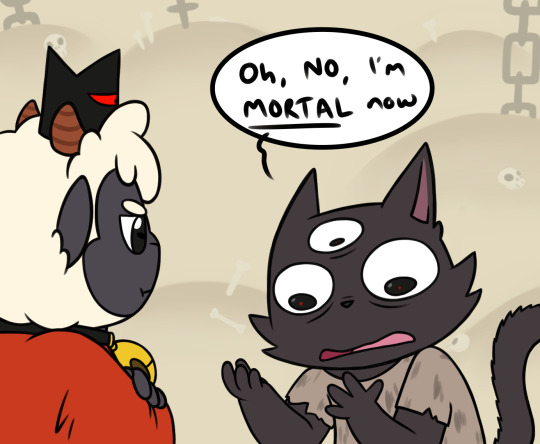
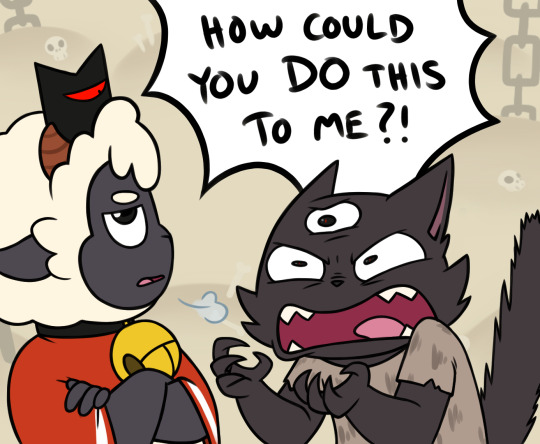
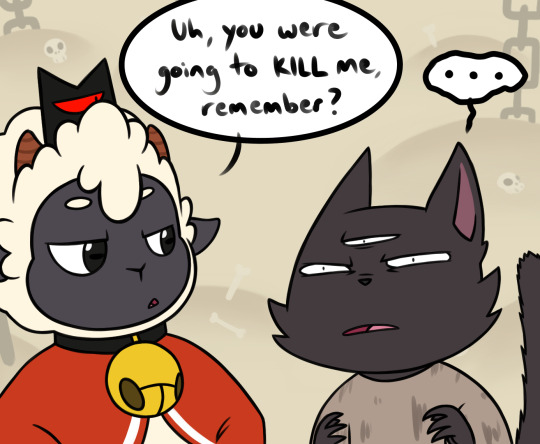
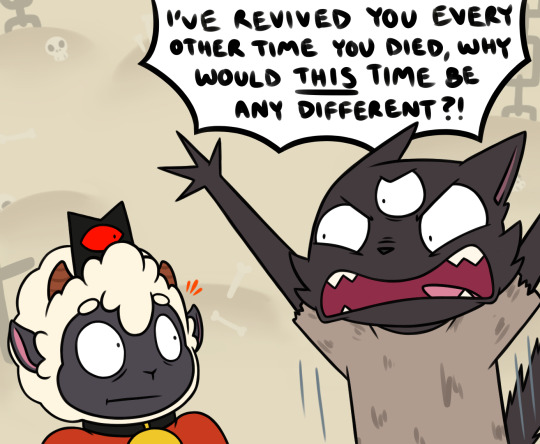
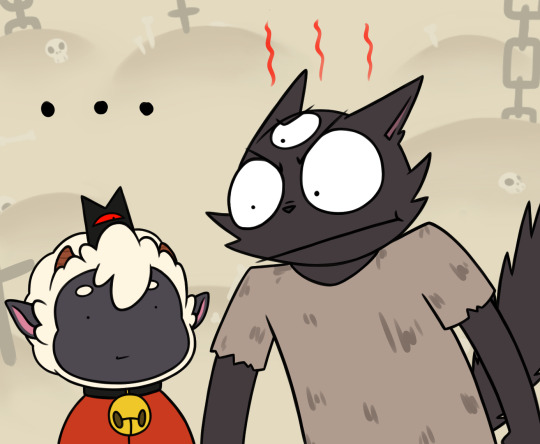
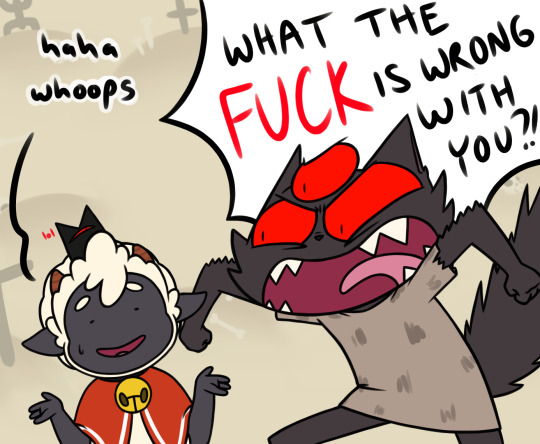
Call this the Whoopsie AU (it's barely an AU)
I mean. Narinder never explicitly SAID the Lamb would stay dead... :3c He probably should have been more specific. >:3c
Part Two:
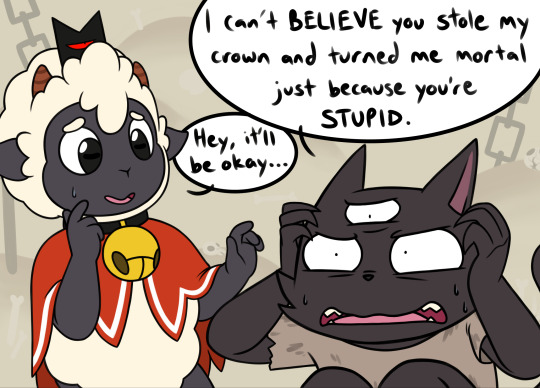
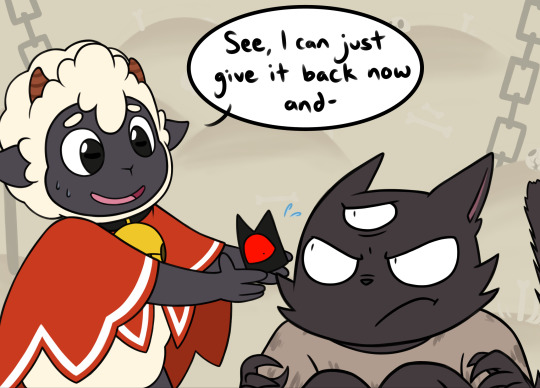
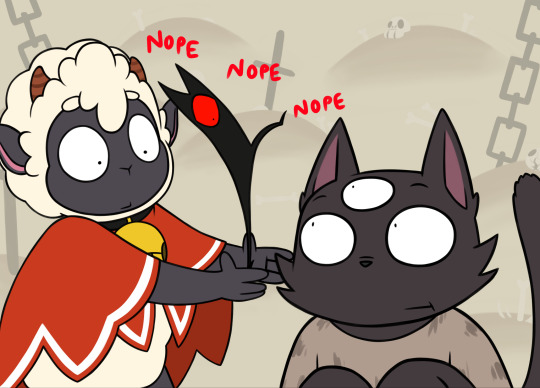
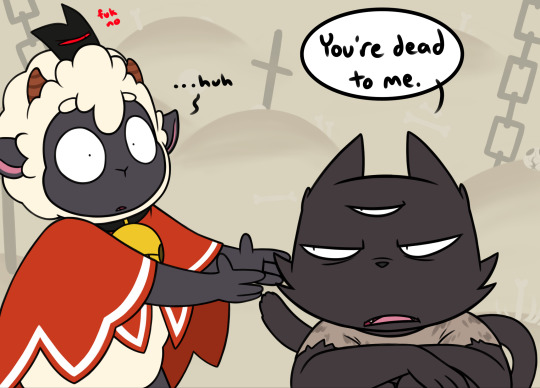
Well. The Lamb tried, but...sorry, Nari, the crown hates you now. Shouldn't have been so quick to lend it out, I guess. :D
Aaaand Part Three:
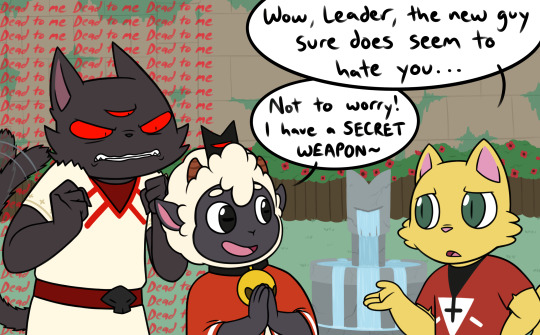
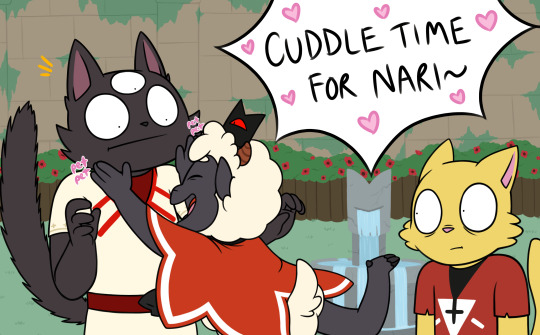
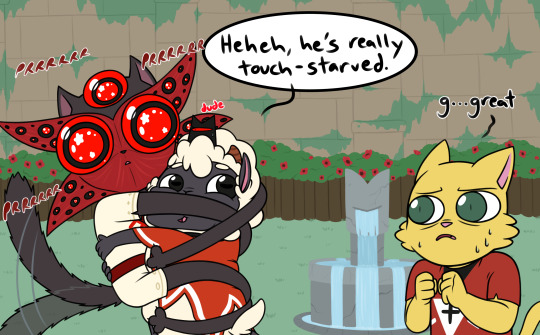
'Isn't he just adorable?' -The Lamb, probably, while their followers smile and nod and internally scream at the brand new hellcat they now have to share living space with...
Anyway, nothing says 'Dead To Me' like following a person around to loudly remind them of how dead they are to you. Right? Right. Narinder's got this all figured out. <:]
#fanart#comics#cult of the lamb#cotl#narilamb#cotl lamb#cotl narinder#cotl yellow cat#this is my headcanon and i'm sticking to it#the lamb is a goofy stabby-babby goober and narinder is just a grumpy asshole who constantly velcroes onto them for hella snuggles#look - if you've been trapped in the afterlife void for over a thousand years - you are GONNA want a fuckton of snuggles#that's just science#the scribble comic i did with narinder and the yellow cat can technically work as part four i guess#only instead of the lamb Going Gremlin at the attempt to steal their other followers' devotion#they just comin' at him for Rad Cuddles OuO#someday i will draw these two with the proper height difference i imagine them having#today is not that day#today is also not the day i pin down exactly how long i want narinder's tail to be#(but i want it to be Very Long - just because)#there are inconsistencies here and there and probably some mistakes but i have been working on these for a week and i am So Tired guys#EDIT: haha yeah i forgot to color in narinder's fukken ears again#fuk :)#EDIT 2: i fixed it but it's probably too late at this point lmao#EDIT 3: THE LAMB'S FUKKEN HORNS JFC#i am not editing this thing anymore cuz i need sleep and the mistakes are already out there *dies of artist mortification*
5K notes
·
View notes
Text
Prompt 297
“I feel like we should be concerned about Tim.”
“Honestly we should always be concerned about him, but what made you realize it this time?”
“Have you seen his search history- wait no you haven’t you haven’t been in the cave all day, look at this-”
“...'Is it legal to adopt the ghost of a kid? Can someone call CPS on a family’s ghost? How to take care of ghosts 101? How do you get a ghost of a child to not be scared? What to do if you find ghost children in your home? What the fuck…?”
“Exactly, I think he needs an intervention.”
Or in other words, after getting thrown into another dimension thanks to the GIW destroying most of Amity, a trio of ghost children decide to crash in this seemingly abandoned apartment building. No one seems to live here anyway…
Tim Drake on the other hand, gets a notification that there’s someone in his main safehouse that he might’ve slightly forgotten about thanks to having his house-boat now, and sees a trio of starved looking ghost kids
#DCxDP#DPxDC#Prompts#De aged Danny#De aged Jazz#De aged Dan#Not seen is Ellie also there but in Core form because she’s too unstable to form a body again yet#Tim’s family is concerned for his sanity#Tim calling his co-dependent hero friends like Kon & Bart: How do you get a child- wait no not like that#Bernard is laughing at him on the phone & asking for pics#The ghost kids have no clue they’ve been adopted yet#They’re hella traumatized & just relieved to have found shelter#Might cry in the very comfortable blankets#Tim: Okay how the fuck do I help these literal dead kids without scaring them away#Tim: Someone call Greta I need her help-
1K notes
·
View notes
Text

Come on and sit next to papa bear
#Halsin#bg3#i should have been in bed like an hour ago but by god did photoshop fight me#but I am the victor and my reward is sharing this blessed man#hella rough sketch i will not render him today#he is 'clothed' if we can call it that#nsft#just incase#because i have a feeling
1K notes
·
View notes
Photo
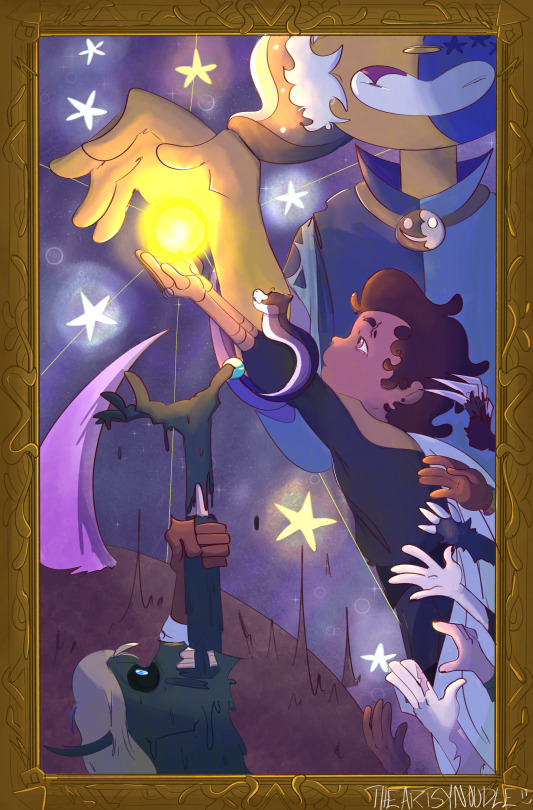
hold on for just a little bit longer
its almost over
#hmmm shows ending!#what the hell!#uhhhh may make one more big thing after the final ep airs but then who knows from there what ill do#this took forever because im hella rusty but#i like it#the owl house#toh#watching and dreaming#ill tag spoilers since some ppl wanna be 100% blind to the eps#toh spoilers#the owl house spoilers#the owl house fanart#luz noceda#the collector#belos#my art
5K notes
·
View notes
Text

Ok but Agent Curt Mega with long hair though?
#wow my second ACM drawing where he just has a different version of Curt’s hair#I will continue to do this#I’m slowly finding solace in Joey’s new lack of hair through this#(/hj)#anyways yeah as always- hella fun to draw#I’m so fuckin pumped for the digital ticket to be released#I’m going to watch it so many times#i could go on for paragraphs about how much I love this show#i love drawing this guy#(is it obvious?)#also wow three consecutive days of art#(now I need to work on schoolwork and work work bc good lord)#does anyone read these?#idk but they’re fun#I love doing silly little tags#fun fact: paper can be made from asparagus#follow me for more fun facts in the tags#I’ve decided I’m going to start doing that#because why not#spies are forever#curt mega#agent curt mega#tin can bros#tcb spies are forever#saf fanart#tcb fanart#spy another day#my art#:)#cw guns
436 notes
·
View notes
Note
Since Fu and his methods have been kinda debated on in this fandom, I've just making sure. Is Marinette over-positiving her memories with Fu since she blames herself for him getting mind-wiped or would he be really scold her on recklessness and taking care of herself?
former. grieving his memory wipe is making any kindness he did seem to gleam like precious stars in her memory, which is making it hit that much harder. she's definitely spiraling around losing him right now, and not seeing the reality that he chose child soldiers to fight a supervillain. he really might've scolded her for being reckless, but nowhere near as lovingly as she's imagining he would - she's putting positive words in his phantom mouth because his loss hurts her more than she's willing to communicate, and its become the cornerstone of her isolation.
#replies#she's HELLA catastrophizing too#just because she sounds even and cool headed doesn't mean she IS#she's just used to being cool headed in hard situations which makes her confidence seem like fact#she's delirious from exhaustion and pain and rn she's being put on the emotional hotspot#which ironically. was one of the sources of her and alya's big blowup argument lmao. it was bad timing and#calculations on lila's part
799 notes
·
View notes
Text
When I see Jason and Bruce acting like the stereotypical "prodigal son and gruff but loving father" (in canon!) my blood boils.
Jason died. Bruce did not avenge him, not even "playing by the rules", so not even by arresting the Joker. He didn't do JACK SHIT after his boy was murdered.
And once Jason came back, Bruce slit his throat in order to save the life of the man who murdered him, and then left him to die in a burning building.
They should be unable to coexist in the same room let alone speak let alone have a "difficult but ultimately loving relationship". I hate you DC I HATE YOU I HATE YOU I HATE
#the enormous injustice of what happened to Jason is hard to even process#he's one of the most mistreated mainstream characters I've ever seen (as in mistreated by the writers and directors)#this boy died and his family didn't lift a finger and suddenly he comes back and everything is his fault#it's his fault for dying it's his fault for being traumatized it's his fault for suffering it's his fault for being angry it's HIS FAULT#while Bruce keeps being heroic and stoic and in the right even if he slits a boy's neck in order to save his murderer's life#because how dare Jason demand love and demand justice and demand his pain to be seen and heard and acknowledged#aaarghbgvnhgrghenvvfkj I know this is nothing new but I'm hella stressed so this is going to be my emotional outlet for today apparently#bruce wayne#jason todd#my meta
1K notes
·
View notes
Text
AU where a robber breaks into the manor but the batkids are there and are actively encouraging the robber to loot the entire house
#dc comics#dc universe#dcu#batman#batfamily#batfam#dick grayson#jason todd#tim drake#stephanie brown#cassandra cain#duke thomas#damian wayne#being a billionaire is hella unethical btw and the kids are here to remind bruce of that#batfamily headcanons#batfamily hcs#batfam headcanons#batfam hcs#i know they were all laughing hysterically inside when bruce became flat out broke#the robber is confused because aren’t they supposed to not be okay with him breaking in?#at least the gotham newspapers are getting content out of this#i get that he needs the money to pay for justice league + batfamily expenses and he’s not that kind of billionaire#but nobody should have that much money
708 notes
·
View notes
Text

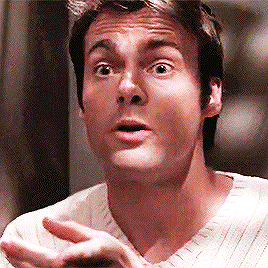

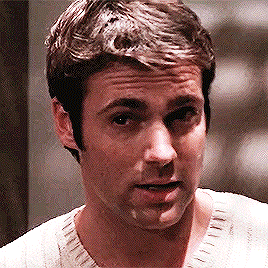
the Iconic Face Journeys™ of "Full Circle"
#whoever raised this man deserves a medal cause you know Little Shanks must've pulled hella faces when. like. confronted with sprouts or smth#stargate#sg-1#stargateedit#daniel jackson#michael shanks#s6#ep22#6.22#***edits#i've said it like four thousand times but i love that he is SO handsome and also makes the most ridiculous faces#he's enjoyable to watch because he's gorgeous yes but also because he's interesting#really i think that the only thing his face is lacking is me touching it with my- [SNIPER SHOT]
318 notes
·
View notes
Text

the cinema of excess
#reuploaded it because he had an extra finger haha#homestuck#dave strider#my art#alpha dave strider#been thinking about him and the other alpha guardians recently. him being a director is a really interesting concept#sweet bro and hella jeff#sbahj
355 notes
·
View notes
Text
indigo park is actually hella sick y'all-



#fanart#digital art#rambley the raccoon#lloyd the lion#lloydford l lion#finley the sea serpent#indigo park#hella peak game#didn't do molly because i can't draw birds 😭 sorry y'all
227 notes
·
View notes
Text
talia secretly adopts all of bruce’s kids behind his back. dick? she got to know him shortly after he became nightwing and supported him through his debut. jason? she had more than enough time to adopt a parental role for him while he was still staying in nanda parbat. tim? she’s been corresponding with him since forever. she was so proud when he committed his first war crime too. steph saw her visiting one of the boys, recognized her and befriended her to spite bruce. duke sort of just assumed she was bruce’s wife after seeing the way the other kids act around her and never questioned it. she’s too scary for him to dare do that, and anyway, she’s pretty chill so he won’t complain. cass sees the whole thing unfold, and while i don’t think she’s talia’s biggest fan, i think she would find the whole thing funny anyway.
bruce never noticed. not until all of his kids had already fallen into the habit of calling her mom
#talia seeing bruce adopt kids left and right: our children#bruce is hella confused when he finds out#the kids never questioned it either. just accepted her as being their mom and moved on#some of them assumed bruce knew since talia knew him so well. some go to her precisely because bruce doesn’t know. the rest just crave chaos#parental talia al ghul#batman headcanon#batman#batfamily headcanons#batkids#bruce wayne#dick grayson#jason todd#talia al ghul#duke thomas#stephanie brown#cassandra cain#tim drake#she took the “sharing is caring” thing a bit too seriously
318 notes
·
View notes
Text
Prompt 156
Bruce is very much not happy. He’s stuck in an absolutely tiny body, with hands that can barely grip onto anything. Not to mention he’s somewhere completely unfamiliar with way too much sun and his body, what, maybe a year? He can barely even stand.
Ugh. Next time he’s definitely not jumping between his teammates and an unknown energy beam-thing.
Now if he could not wobble and trip over what was his outfit but now seems to be a way too big cloak or cape, that would be great. Actually it might be his gear just well, only his cape. First thing is first, finding out where- or even when- the heck he is.
Danny is honestly blaming Clockwork for everything when he spots a baby that could pass as his baby brother. And he knows he doesn’t have any more clones, seeing as he cleaned out Vlad’s lab himself. So. There’s apparently a tiny very liminal-feeling baby crawling around in what is practically a war zone thanks to the GIW.
So he could be forgiven for picking the tiny child up as he runs, because if the GIW does another attack or bombing… Yeah, he’d rather the literal infant be in one of the safe zones protected by altered ecto shields, even if there was no clue as to where they came from.
#dcxdp#dpxdc#de aged bruce#What did Bruce get hit by? Who Knows#But it’s his turn to be de-aged & in another dimension#He is incredibly concerned the more things he sees#Amity looks like a war zone#He is stuck there for a WHILE#Like at least a year even if in the DC world it’s only a few days#Probably was in the DP world for a while more#Eternal quartet doing their best to raise a toddler who they suspect is a reincarnation or something similar#Bruce is a very scowly toddler who has a few panic attacks when he realizes that some people leaving the shelter aren’t coming back#He’s going to have so many breakdowns & be so clingy because these are all teens & kids#There’s not a lot of adults still alive which is Very Concerning#Welcome to one of the darkish timelines#implied death#Liminal batman#liminal amity park#or at least hella eco-contaminate
855 notes
·
View notes
Text
Tokyo revengers |°-context: you visit your grandparents at the country side and he willingly taged along
๑-featuring: kazutora, chifuyu, baji

°- Kazutora Hanemiya
• he had to get used to it for a while but afterwards he'd actually kinda enjoyed it
• would stroll around and admire the wide fields bigger than a football stadium in awe, he'd also lean against a tree or something and have a peaceful moment for himself while enjoying the birds chirping
• would give random scary looking spiders the most basic names like Dave and think it's funny (it's actually pretty funny)
• liked sitting by the furnace to put wood in to heat up the house, even if he did burn himself by accidentally touching the hot metal by the sides, he still liked being taught how to use it and be in charge of it
• got distracted for some time by sitting on the grass and watching a snail slowly move it's small body over a large rock, he was there for 7 minutes before he realised what he was doing, and the snail still hasn't gone over the rock since it decided to go in multiple random directions in the same spot- he was tempted in flicking it off with his finger but chose not to
• hated waking up in the morning tho, he was way too tired to keep his eyes open for more than a few seconds
• would he come back? it's not exactly his thing but if he were to pass by the area then he'd happily wonder about a little while
°- chifuyu matsuno
• he'd be enthusiastic about the amount of cows that are on the fields, the second he saw one cow he yelled out "cow! :o" but then when he saw a whole field of em he yelled out again "more cows! :D"
• beautiful sunsets over here and would take multiple photos of the sky
• would crouch down and inspect an odd insect that he's never seen before and think that he discovered an undiscovered bug and give it a whole scientific name that just consists of random phrases conjoined together and is hard to pronounce the second time
• at first he liked being given a job that included a lot of physical work but after a while he grew to dislike it, he still tried to finish it so that your grandparents wouldn't hate him for it - but the naps afterwards were delectable
• got woken up in the middle of the night and just sat there in bed for a while almost mesmerized by how dark it was, like- pitch black
• enjoyed the home grown fruits and vegetables, there was a clear difference between store bought compared to grown in the garden/field - he took a liking to the yellow apple tree most due to how sweet and semi soft the apples are
• would he come back? potentially if he wouldn't be put to do heavy work, he enjoys most of the other stuff tho
°- Baji Keisuke
• would pet the neighbours cats that are wondering about and try and feed them ham or something
• sits outside somewhere enjoying the breeze and the chirping birds in the distance, usually you wouldn't be able to hear this many birds all at the same time anywhere else other than the country side, not even in a nearby forest
• he'd be pretty chill at staying the night and enjoy looking at the stars since you can't see them clearly in the city
• mosquitos love him for some reason and he hates that he gets bit easily, only thing he hates about being here
• enjoyed chopping the wood with an axe to later use to heat the house up, he was pretty good at it as well but he was only allowed to do it a few times before the axe got taken away cause he nearly hurt himself. got kinda disappointed by that.
• would he come back? definitely, it's not a life style he'd want to commit to but for a short while he'd be chill with it
♡--
#wrote this while on 'holiday'#ngl it wasn't as bad as i thought it would be#i mainly thought that just because of how the previous times went#but- i still hated it mainly cause of some certian people#and it was hella exhausting#tokyo revengers#kazutora hanemiya#baji keisuke#kazutora#kazutora x reader#matsuno chifuyu#baji x reader#tokyo revengers x reader#chifuyu x reader#baji#chifuyu#chifuyu matsuno x reader#kazutora hanemiya x reader#baji keisuke x reader#tokyo revengers headcanons#tokyo revengers fluff
222 notes
·
View notes
Text
Ok bitches listen up. I need at least *one* Hazbin Hotel writer to do this scenario
Reader is a hellborn(idc what species except for hellhound because this is my request fuck off) and homeless and she got knocked up and baby daddy ditched so Charlie being the angel she is offers reader a room.
Fast forward to episode 5 (whoever starts this feel free to do the whole series but this is mainly focusing on ep 5(OMG WHAT IF READER GOES INTO LABOR DURING THE FINAL BATTLE IN EPISODE 8 FHUXHEHDJ. Chille anyways-)) and the reader is ready to pop any day now. Charlie is introducing the hotel residents to Lucifer and they get to reader and he's just wanting to touch the belly and looking at it with almost child like wonder lookin like this emoji: 🥺
Normal hotel shenanigans ensue. Thanks for coming to my TED talk UwU
#lucifer morningstar#hazbin hotel lucifer#hazbin hotel x reader#habzin hotel spoilers#alastor#angel dust#charlie morningstar#vaggie#niffty#hazbin hotel husk#lucifer x reader#lucifer magne#DONT BULLY ME LET ME HAVE THIS#Its ironic because i already decided im never fucking having kids 😂#im absolutely feral abt this man its highly unhealthy#he makes me question my asexuality#bonus points if alastor is hella platonically protective#if/when someone does this tag me plz XD
235 notes
·
View notes